"Make no mistake, my friends... we are moving out of the darkness, and into the light."- Thomas Cranmer
Thomas Cranmer is the Archbishop of Canterbury during most of Season Two of The Tudors (the position traditionally considered Head of the Church of England). Although initially he seems to be a nervous, self-depracating nonentity who toadies to his patrons, Cranmer is gradually shown to be a fervent supporter and advocate of the Protestant Reformation in England, as well as a good friend and admirer of both Thomas Cromwell and Anne Boleyn. Incidentally, he is also uncle to Queen Catherine Parr, Henry's sixth wife (who is also a Protestant) although the two are never shown together. Contrary to the significant role he continued to play during the Tudor dynasty, Cranmer did not appear further after the second season, though he is mentioned. He is played by Scottish actor Hans Matheson.
Role in the Series[]
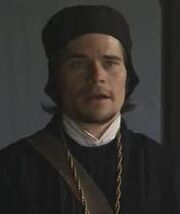
Thomas Cranmer arrives at Henry's court (Season 2)
in the first episode of Season Two, Cranmer comes to court with his patron and friend Thomas Cromwell, secretary to the King. Like Cromwell, Cranmer has a previous association with the notorious Boleyn family, having served as Thomas Boleyn's personal chaplain. Cromwell mentions to the King and to George Boleyn that Cranmer was the one who suggested he solve King Henry's 'Great Matter' by canvassing theological colleges around Europe. Henry shows his gratitude to Cranmer by initially appointing him his personal chaplain and later Holy envoy to the Emperor. The nervous Cranmer is shown to have little self-confidence at first, being astonished and emotionally overwhelmed by the King's favor upon him.
However, Cromwell has long noticed and shares Cranmer's passionate support of Protestantism and church reform, and when sending Cranmer to remonstrate with the Pope and the Emperor in Europe he encourages him to visit Nuremberg, the first city fully under Lutheran rule. In Episode 2.02, Cromwell is amused to learn that, since priests are allowed to marry in Nuremberg, Cranmer has done exactly that- despite the fact that it is still illegal in England. Cranmer later smuggles his new German wife, Katerina, back to England in a giant crate, although he occasinally has to put her back in to move her around town. She is clearly well-educated, able to hold her own in philosphical debates with both Cromwell and her own husband, to his surprise.
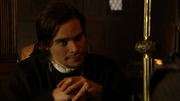
Cranmer discusses the Reformation with Cromwell
In the next episode, with Archbishop of Canterbury Warham dead, Henry- encouraged by his betrothed Anne Boleyn, and by Cromwell- nominates Cranmer as his successor. Pope Paul III, underestimating Cranmer as a 'nobody' and seeking to pacify Henry in response for his opposition to Henry's annulment, consents to appoint Cranmer as the Archbishop. This backfires against the Pope spectacularly in the same episode when Cranmer quickly declares Henry's marriage to Catherine of Aragon null and void, while legalizing the King's new marriage to Anne and officiating at her coronation. After Princess Elizabeth Tudor is born, Cranmer- her godfather- baptizes her in episode 2.04. He allies himself closely with Queen Anne, whom he admires as a fellow devoted Reformer.
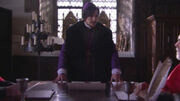
Cranmer nullifies Henry's marriage to Catherine of Aragon
During episodes 2.04-2.05, Cranmer becomes more confident- and aggressive- when he leads the prosecution against the Catholic Bishop (later Cardinal) John Fisher and Sir Thomas More, neither of whom will take the Oath of Succession and Supremacy- recognizing Henry and Anne's children as legitimate royal heirs, and Henry as supreme Head of the Church of England. Although he harshly demeans Sir Thomas More at his trial and accuses him of malicious actions (since More remains devoutly Catholic against Cranmer and Cromwell's reforms, and acts contemptuous towards the Lutheran Archbishop) Cranmer nonetheless attempts to save More from being executed by suggesting Henry compromise (since More admitted he would swear to the Succession but not the Supremacy). However, Henry refuses, and both Fisher and More are beheaded in 2.05.
Cranmer is next shown presiding over George Boleyn's wedding in 2.06; he and George later witness the printing press that Cromwell is now using to spread Lutheran propaganda. In episode 2.07 Cromwell and Cranmer discuss what should be done about the monasteries whose monks refuse to take the oath, with Katerina criticizing them for not creating social reforms quickly enough (compared with Lutheran states in her native Germany).
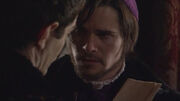
Cranmer confronts his ally, Cromwell, over the accusations against Anne Boleyn

Cranmer takes Anne Boleyn's final confession
In the two final episodes of Season Two, Cranmer is horrified by the accusations of adultery against Queen Anne and her subsequent arrest; he is the only one who continues to defend her against the enraged King, arguing with Cromwell that Anne has been the leading voice of their Reformation and he cannot believe she is guilty. However, when all her supposed lovers- including her own brother- are executed, Cranmer realizes his continued opposition will likely lose him his life, so he reluctantly declares Anne's marriage null and void at Henry's request. He visits Anne in the Tower after talking with her warden William Kingston, promising he will do his best to protect her daughter Elizabeth (who is now illegitimate), and takes her last confession; he is touched by her declaration that she was never unfaithful to Henry, but intends to die willingly to please him. All the same, Cranmer makes no serious attempt to save Anne's life. In the Season Two Finale, Cranmer stands among the crowd at Anne's execution with tears in his eyes; she meets his gaze before making her final speech, and he leads the crowd in praying for her.
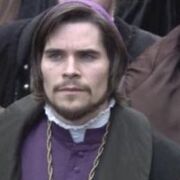
Archbishop Cranmer at Anne Boleyn's execution
Despite not appearing in any subsequent episodes, Cranmer is mentioned briefly in Seasons Three and Four. During Series three, the Catholic Pilgrims of Grace refer to him, along with Cromwell, as a blatant heretic. In episode 3.05, Henry also deliberately avoids summoning Cranmer (despite him being Archbishop) when he and the conservative Bishop Gardiner ordain the Six Articles of Faith- which returns the Church of England (for the most part) back to Catholic doctrine. Discussing the Articles later, Richard Riche mentions to Cromwell that Cranmer will now have to send his wife and son back to Germany to avoid prosecution, since the Articles now forbid priests to marry. In the series finale, Henry instructs Edward Seymour (uncle to his heir and son Prince Edward) to take charge of the government alongside Cranmer during Edward's reign until he is of age.
Fate[]
Although the character of Thomas Cranmer disappears from the Tudors after Season Two (with Matheson leaving the series), Cranmer in fact remained an influential figure in Henry's court despite the King's ambiguous commitment to true Reformation of the Church. As Archbishop of Canterbury, despite being the clerical Head of the Church of England Cranmer had little real authority; his main role in the English Reformation was as a scholar, theologian and proposer of reforms, while the power to rule and create the reforms themselves was wielded by the King and Thomas Cromwell. Cranmer managed to survive the downfall of his friend and colleague Cromwell; as with Anne Boleyn, Cranmer made no serious effort to save Cromwell from execution, but he made it clear he did not believe Cromwell was guilty of treason. It was in fact Cranmer who became aware of Katherine Howard's sexual history and sent the King a secret letter to that effect (the letter is shown being delivered at the end of 4.04 during the church scene, but its sender is left anonymous); Cranmer subsequently questioned Katherine and determined her guilt (in the series this questioning is done by Bishop Gardiner instead).
He also served as Archbishop to Henry's young son and successor Edward VI. In contrast to the more submissive role he had held under Henry, during Edward's reign Cranmer was vital in the development of a genuinely Reformed Church alongside Edward's uncle and Regent, the Lord Protector Edward Seymour. Along with a handful of other Protestant scholars and divines, Cranmer wrote The Book of Common Prayer, the first edition of which was published in 1549; revisions subsequently appeared in 1552 and 1559. Edward VII maintained unswerving commitment to reforming the English Church (commonly known now as the Anglican Church) during his short reign. These reforms included inclusion of homilies in the Mass; abolition of clerical celibacy; a reduced role of images and saintly veneration during worship; elimination of elaborate vestments worn by clergy; and many other changes.
Cranmer's life's work put him in danger when Mary I, a devout Roman Catholic, ascended to the throne after Edward's death. Under Mary, Cranmer was tried for both treason and heresy. His wife and children escaped to Protestant Germany. Although Cranmer recanted his Protestant positions as a means of escaping punishment, Mary condemned him to burn (the standard manner of execution for heretics), although canon law held that recanted heretics should be pardoned. However, she determined to make an example of Cranmer and he suffered the ultimate penalty. Immediately before his execution Cranmer retracted his previous recantations, denounced the Papacy and affirmed his true beliefs as a Protestant. Cranmer's death which, together with the executions of his Protestant colleagues Nicholas Ridley and Hugh Latimer, is remembered today, throughout the worldwide Anglican Communion, on the "Commemoration of the Oxford Martyrs." Their sacrifices were among the greatest martyrdoms for the Protestant cause during Mary's short, bloody reign, and Cranmer's, in particular, provided a rallying point for Protestants who favored her half-sister (and Cranmer's goddaughter) Elizabeth as the true Queen of England. Most of Cranmer's religious doctrines (with the notable exception of his emphasis on sermons) were restored by Elizabeth I when she became queen after Mary's death.
Quotes[]
- "The union between Catherine of Aragon and King Henry is declared... null and void. And, therefore, the union between King Henry and Anne Boleyn is declared both legal and right... in the eyes of God."
- (concerning his recent elevation by Henry) "The thing I don't understand, Mr. Cromwell, is why me? I... I am nothing, Mr. Cromwell."
- "I cannot believe she is guilty of such monstrous crimes!... Though I am sure the King would not have proceeded against her in such a manner if she were not cupable... Mr. Cromwell, if the Queen is convicted, is not our Reformation in danger?! Has she not been our champion, our great advocate?!" Cromwell: "Yes- and now, she is our greatest liability."
- (to the condemned Anne Boleyn, concerning her daughter Elizabeth) "I assure you, I shall do everything in my power to keep her always in the King's good and gentle graces."
- "Master Kingston, please go and report my Lady's true and last confession- so the world will know it."